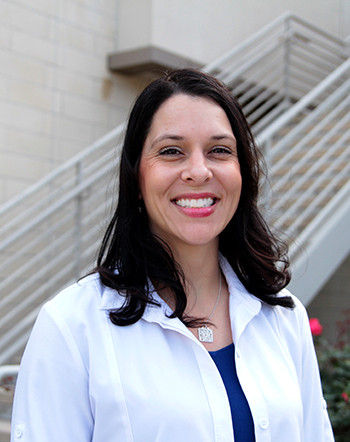Putting the R in LCRP
Cancer
The Nancy N. and J.C. Lewis Cancer & Research Pavilion participates in cancer research in a variety of ways, especially through its robust clinical trial program
At the Nancy N. and J.C. Lewis Cancer & Research Pavilion, we are committed to providing the highest quality treatments and services to our patients. One way we stay in the forefront of the latest advances in technology and treatment is the R in LCRP – Research.
Cancer research is very broad. It can range from research done on cells in a petri dish in a lab to testing new therapies in cancer patients, explains Stephanie Smith, manager, oncology clinical research, CCDR & Trials.

At the LCRP, we participate in cancer research in a variety of ways, most commonly through clinical trial participation. Why is cancer research so important to us? So our patients have choices when it comes to making decisions about their healthcare, Smith says.
“We want to be able to offer patients various treatment options, including cutting edge clinical trials right here at home,” Smith continues. “When a person has cancer, they prefer to not have to travel long distances to receive care. Our goal is to have as many trials for most of our more common cancers and even trials for rarer diseases. We want to be able to have something to offer everyone.”
About clinical trials
The LCRP offers close to 90 clinical trials at any given time. A clinical trial is a type of research study that only includes patients who choose to take part, Smith explains. These trials can range from studies on managing symptoms to studies that treat advanced cancer. (Find available clinical trials here.)
“Some clinical trials are studying something like quality of life or how to manage symptoms. Other clinical trials are testing a new drug or intervention compared to the current standard of care for treating a specific disease,” Smith says.
But Smith stresses that patients will ALWAYS receive high quality treatment on a clinical trial.
“I would like the public to not think of a clinical trial participation as being a guinea pig,” Smith says. “That’s how many patients – even jokingly – refer to themselves. But they are far from it. Yes, sometimes the clinical trial treatment might include an investigative drug, but the patient is a patient always first. They will always receive high quality care, and being able to take advantage of a treatment long before it’s widely available is something that I would like patients to consider.”
Related Article: Melanoma cancer patient feels ‘blessed’ to participate in a clinical trial at the Lewis Cancer & Research Pavilion
To participate in a clinical trial, the patient must meet certain parameters, and they must sign a consent document, which your doctor or a research nurse will go over with you. The informed consent document outlines all of the details of the clinical trial from why the study is being done to the potential risks of joining, as well as other important details, Smith says. The patient must sign the consent in order to join the trial.
“All clinical trials have a very specific plan that has been reviewed and approved by many people. This is called the study protocol,” Smith says. “All patients must then be deemed ‘eligible’ by the parameters set by the protocol before they can be enrolled.”
Consent is ongoing, Smith adds. It’s not a legal contract and a patient can decide to leave the trial at any time.
How long the trial lasts can vary. Some trials follow a patient for six months to a year. And then some of the breast cancer trials follow women for 20 years. That doesn’t mean treatment lasts for 20 years, Smith says, but that the patient is followed that long to see how they are doing.
Throughout your time on a clinical trial, you will work with a research nurse or clinical research coordinator. They will meet with you at your regularly scheduled appointments, therefore a clinical trial should not require too much extra time once enrolled. Smith does say before starting a trial, it’s not uncommon that extra tests or blood work may be needed.
“One important element of a clinical trial is that we do everything possible to minimize burden,” Smith says. “Therefore, the study strives to be designed in a way that minimizes the time commitment. We seek to do everything in the same number of visits you’d have if you were not on a clinical trial.”
If you get diagnosed with cancer and are interested in a clinical trial, talk to your doctor or nurse navigator about available trials at the LCRP. You can search for them on our website or the LCRP also recommends georgiacancerinfo.org or clinicaltrials.gov.
Other areas of research at the LCRP
- Cancer Care Delivery – CCDR is a multidisciplinary science that seeks to improve clinical outcomes and patient well-being by intervening on patient, clinician and organizational factors that influence care delivery. Sometimes even the hospital co-workers are the study participants. For example, we participated in one CCDR trial that studied how our healthcare providers handle being longtime caregivers to cancer patients. We’ve also participated in two different smoking cessation trials that study different interventions to help our patients quit smoking.
- Financial studies – We’ve participated in several studies looking at how having cancer impacts a patient financially as we know there are many financial implications associated with having cancer.
- Biospecimen research – For more than 14 years, we also have participated in biospecimen research. In these studies, tissue samples, called biospecimens, are collected and sent to a lab. This can help researchers study how cancer develops, grows and spreads so they can find new methods of prevention, early diagnosis and treatment.